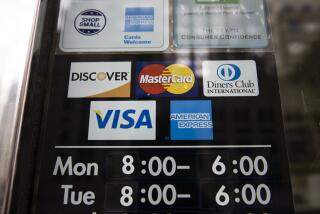Small businesses likely to see more credit card offers
- Share via
Credit card solicitations probably will be showing up with more regularity, again, in small-business owners’ mailboxes.
It’s not that the card industry suddenly considers small businesses to be a better risk. Rather, it’s because under the 2009 credit card reform legislation, cards for small businesses are excluded from some restrictions on raising interest rates, among other actions.
“You are going to find a real effort on the part of card issuers to look at this as an opportunity to grow credit cards outstanding at fairly significant interest rates,” said David Robertson, publisher of the Nilson Report, a newsletter based in Carpenteria, Calif., that covers the payment systems industry.
So, card issuers might want to attract more small-business customers, but those potential customers might be scared off by today’s stricter qualifications for credit, the lack of protections and the high interest rates.
Rates for business credit cards grew faster than for other types of cards last year, according to IndexCreditCards.com, an online credit card marketplace. A look last week at offerings on several credit card companies’ websites showed initial advertised rates were still steep.
CapitalOne’s No Hassle Cash small-business card offered a rate of 14.99% for the best credit risks and as much as 22.99% for those with poorer credit. The rate for several of the Chase Business Ink cards ranged from 13.24% to 19.24%.
And those are variable rates that can grow. It’s a daunting environment for small-business owners, who often rely on credit cards to fund their businesses because they are too small or too new to qualify for a traditional bank loan.
Another peril: The rates can take a huge jump if the cardholder makes a late payment. For example, Chase can raise interest on its cards to as high as 29.99%. Consumer cards can get that high too, on a penalty rate, but the new regulations offer those card users some relief if future payments are made on time.
So it’s no surprise that credit card usage by small businesses is down, even if solicitations are on the rise.
“There has been a decrease in the last year among small businesses that rely on credit cards as a source of financing — where it used to be nearly half of all small businesses, it is now just slightly over one-third,” said Molly Brogan, spokeswoman for the National Small Business Assn., citing preliminary results for the group’s upcoming 2010 economic report.
The report will also show that credit cards have fallen from first place to third as the most-used source of financing, probably because of frustration with credit card terms over the last few years, she said.
Ram Katalan, president and co-founder of NorthStar Moving Corp. in Chatsworth, uses business credit cards but is frustrated that interest rates on them rose to as much as 19% during the recession. He said he has been unable to negotiate lower rates or higher credit limits.
Katalan uses his cards up to their limits to pay expenses such as hotel bills for his movers, rather than give his employees cash, then he pays the full balance, or close to it, “just to use them again the following month. It’s more of a cash card than a credit card,” Katalan said.
He has largely given up on getting new credit cards — which he hoped to use to help expand his business — after a round of inquiries turned up offers for “insane” interest rates, he said.
Industry watchers say higher rates are somewhat justified for small businesses because these firms pose a higher credit risk than their big counterparts. Small businesses have a high failure rate — which has gotten even worse in recent years — and need relatively high credit limits.
When the economy tanked, card issuers cut small-business owners’ credit limits and hiked rates.
“The worst appears to be over,” said Gerri Detweiler, personal finance expert at credit card marketing website Credit.com. “But that doesn’t mean everyone is out of the woods. Issuers are still very, very risk adverse when it comes to credit cards.”
Teresa Delfin, who started her Mountain Mama Inc. apparel business in 2009 in Ontario, hopes the worst is over. Because her business does not yet qualify for a bank loan, she is hoping that a credit card will help her expand.
“We are expecting to need more capital to basically fulfill bigger orders,” she said last week as she prepared for an industry trade show.
More to Read
Inside the business of entertainment
The Wide Shot brings you news, analysis and insights on everything from streaming wars to production — and what it all means for the future.
You may occasionally receive promotional content from the Los Angeles Times.










